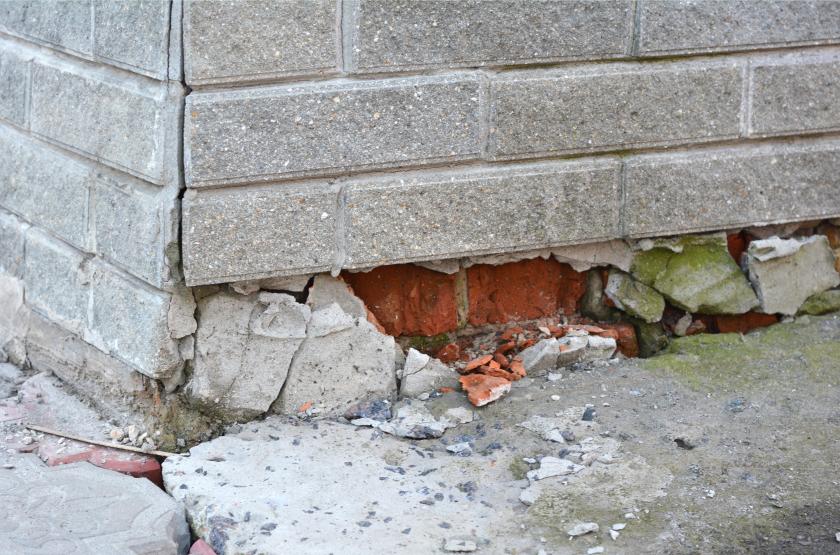Imagine this…

As a first-time homebuyer, you’re excited about finding your dream home. During the house-hunting process, you discover a property that seems perfect, but you’re unsure about the foundation’s condition. Before making any decisions, you wisely schedule a professional foundation inspection. The inspection reveals some minor settling cracks, but the inspector assures you they are normal for the property’s age and not a cause for concern. Relieved by the expert’s assessment, you proceed with the purchase, confident that you’ve made a well-informed decision and safeguarded your investment for the future.
What is Home Foundation?
A home foundation is a critical structural element that supports the entire weight of a building and transfers it to the ground. It is the base on which the entire structure is built, and its stability is essential for the safety and longevity of the home.

Types of Home Foundations
- Slab Foundation: This type of foundation is a single, thick, and flat concrete slab that extends across the entire footprint of the home. It is typically used in areas with stable soil conditions and little risk of freezing temperatures.
- Crawlspace Foundation: A crawlspace foundation elevates the home slightly above the ground, providing access to plumbing and electrical components. It consists of short foundation walls with open space beneath the house, allowing for ventilation and easier maintenance.
- Basement Foundation: A basement foundation provides an entire level of living or storage space below the main floor of the house. It involves the construction of deep foundation walls, often made of concrete, to support the structure and retain the surrounding soil.
- Pier and Beam Foundation: This foundation type uses a series of concrete piers or wooden posts to elevate the home above the ground. It is common in areas with uneven terrain or regions prone to flooding.
What are the common foundation issues?

- Settling: Settlement occurs as the foundation adjusts to the soil beneath it. In some cases, excessive settling can lead to uneven floors or structural instability.
- Water Damage: Water infiltration can weaken the foundation over time, especially in basements and crawlspaces, leading to mold, mildew, and deterioration of the materials.
- Cracks: Over time, small cracks may develop in the foundation due to settling, natural movements in the soil, or structural issues. While small cracks are common, significant ones can indicate more serious problems.
Why is foundation inspection important?
A foundation inspection is crucial for first-time property buyers for several reasons:
Structural integrity: The foundation is the backbone of a property, supporting the entire structure. A foundation inspection can identify potential issues like cracks, settling, and shifting that may compromise the structural integrity of the property, ensuring that the home you’re purchasing is safe and secure.
Preventing costly repairs: Foundation problems can lead to expensive repairs if not addressed promptly. By identifying any existing or potential foundation issues during the inspection, you can avoid costly surprises later on and take the necessary steps to prevent further damage.
Water intrusion: A foundation inspection can detect signs of water intrusion, such as seepage, dampness, or mold growth. Water intrusion can cause severe damage to the foundation, as well as the interior of the property. Identifying and addressing these issues can prevent long-term damage and health hazards.
Pest infestation: A damaged foundation can provide entry points for pests such as rodents and insects, leading to infestations that can cause property damage and health concerns. A foundation inspection can identify any potential entry points and suggest measures to address them.
Resale value: A well-maintained foundation is essential for maintaining the property’s resale value. By identifying and addressing any foundation issues during the inspection, you can protect your investment and ensure that your home retains its value over time.
Mortgage and insurance considerations: Some mortgage lenders and insurance providers may require a satisfactory foundation inspection before approving a loan or providing coverage. A thorough inspection can help you meet their requirements and avoid any delays in the home buying process.
Negotiation leverage: If the foundation inspection reveals any issues, you can use this information to negotiate a better price, request that the seller make necessary repairs before closing, or include contingencies in your offer to ensure these issues are addressed.
Planning for future maintenance: A foundation inspection can help you identify areas that may require ongoing maintenance or future repairs. This information is essential for budgeting and planning to keep your property in good condition.
Peace of mind: A thorough foundation inspection provides peace of mind, knowing that you’ve assessed the property’s foundation thoroughly and addressed any concerns. This confidence will allow you to enjoy your new home without worrying about potential foundation issues.
In summary, a foundation inspection is vital for first-time property buyers to make informed decisions, protect their investment, ensure the safety and stability of their home, and achieve peace of mind in the home buying process.
Contact us to schedule your inspection and gain peace of mind!
Follow us!
For more details you may also follow our Facebook, Instagram, and YouTube!



